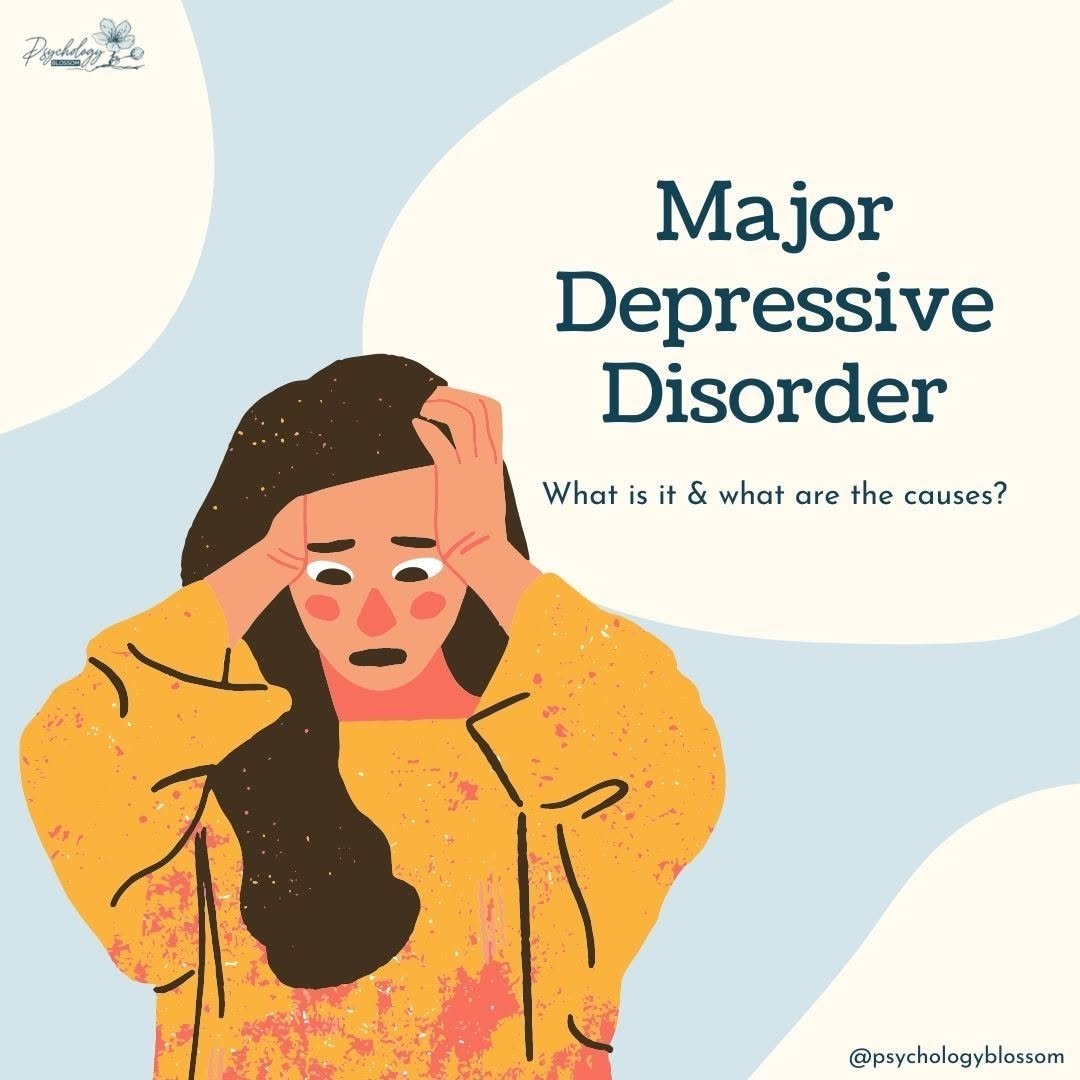Major Depressive Disorder (MDD): Understanding Symptoms, Causes, Diagnosis, and Effective Treatment
Major Depressive Disorder (MDD) is more than feeling sad or having a difficult week—it is a medical condition that involves the body, mood, and thoughts and can seriously impair how a person works, studies, sleeps, eats, and enjoys activities that used to feel meaningful. Episodes can occur once or recur across the lifespan, sometimes with long symptom-free intervals, sometimes returning in response to stress, and sometimes without a clear trigger. Because MDD affects daily functioning and relationships, timely recognition and treatment are essential for recovery and relapse prevention.
Major Depression vs Minor Depression
A major depressive episode is defined by a cluster of symptoms that are intense, persistent, and functionally impairing. People may feel deeply low, lose interest or pleasure, struggle to sleep or oversleep, experience appetite and weight changes, feel slowed down or agitated, and wrestle with guilt, worthlessness, or hopelessness. Concentration falters, decisions feel harder, and daily tasks can seem overwhelming. Without appropriate treatment, major episodes can recur and sometimes last months. Because energy and motivation are often lowest when help is most needed, supportive family, friends, colleagues, and healthcare providers play a crucial role in encouraging care-seeking.
Minor depression—sometimes called subthreshold or mild depressive symptoms—can still be distressing and disruptive. Individuals often manage to attend work, fulfil obligations, and stay socially present, yet carry a heavy internal burden. They may dismiss their struggles as “not serious enough” to warrant support. However, early intervention at this stage can restore functioning faster and can help prevent an escalation into a major depressive episode. In both presentations, help is appropriate; severity guides the intensity of treatment, not whether treatment is justified.
Possible Causes
Depression arises from an interplay of factors. Genetics can increase vulnerability; people with a family history of depression may be more likely to experience it, although genes do not determine destiny. Physiological factors such as hormonal shifts, circadian rhythm changes, chronic medical conditions, pain, and medication side effects can contribute. Anatomical and brain-chemistry differences can influence how mood, reward, sleep, and stress systems function. Socioeconomic factors—including financial strain, job insecurity, discrimination, and limited access to healthcare or community support—can increase chronic stress and reduce buffers that protect mental health. Often, multiple influences combine; understanding an individual’s unique pattern helps tailor treatment.
Common Symptoms
Symptoms vary in mix and intensity, but several core features tend to recur. Many people experience decreased energy and fatigue, describing themselves as “slowed down” or “running on empty.” Interest and pleasure in once-enjoyed hobbies and relationships fade, making participation feel pointless or exhausting. Persistent sad, anxious, or empty mood is common; some feel numb rather than overtly sad. Feelings of guilt, worthlessness, or helplessness may dominate self-talk, amplifying self-criticism and narrowing hope. Cognitive changes—such as trouble concentrating, slowed thinking, indecisiveness, and mental fog—can impair school or work performance.
Sleep may be reduced or excessive; appetite may decrease or increase, leading to weight change. Agitation and restlessness can alternate with lethargy. These symptoms are medical, not moral, and respond to evidence-based care.
How Major Depressive Disorder (MDD) Is Diagnosed
Diagnosis is made by a qualified clinician after a thorough evaluation of symptoms, duration, severity, functional impact, medical history, medications, substance use, and family history. Clinicians also screen for medical contributors such as thyroid problems, anaemia, vitamin deficiencies, sleep disorders, chronic pain, and medication effects. Because several conditions can mimic or overlap with depression—bipolar spectrum disorders, anxiety disorders, trauma-related conditions, grief, neurodevelopmental disorders—careful assessment ensures the right treatment plan. Self-report questionnaires can help monitor severity, but diagnosis rests on a clinical interview and, when helpful, collateral input from loved ones.
Treatment Overview
Two main treatments are available for Major Depressive Disorder: medication and psychotherapy. Many people benefit most from a combined approach, especially for moderate to severe episodes. Treatment choice depends on symptom profile, personal preference, prior treatment response, coexisting conditions, and access to care. Whatever the path, continuity matters: adhering to a well-structured plan and following up regularly improves outcomes and reduces relapse risk.
✽ Medication
Antidepressants target brain systems involved in mood, energy, sleep, and concentration. Selective Serotonin Reuptake Inhibitors (SSRIs) are commonly used first because they are generally well tolerated and safer in overdose than older medicines. Serotonin-Norepinephrine Reuptake Inhibitors (SNRIs) can be helpful, particularly when pain or significant energy deficits are present. Atypical antidepressants operate through various mechanisms and may be chosen to address specific symptom patterns such as sleep or appetite changes. Tricyclic Antidepressants can be effective but tend to have more side effects and are usually considered after other options. Monoamine Oxidase Inhibitors (MAOIs) require dietary restrictions and careful monitoring due to interactions but can be life-changing for select patients.
Any medication plan should be personalised, with discussion of benefits, potential side effects, expected time to improvement (often 2–6 weeks), and the importance of not stopping abruptly without medical guidance.
✽ Psychotherapy
Psychotherapy—structured, goal-directed work with a mental health professional—is a proven treatment for depression. Cognitive Behavioural Therapy (CBT) helps identify and shift unhelpful thinking patterns, increase meaningful activity, and build problem-solving skills. Interpersonal Therapy (IPT) focuses on relationship patterns, grief, role transitions, and conflict that can precipitate or maintain depression. Other approaches, such as behavioural activation, mindfulness-based strategies, and compassion-focused work, can complement CBT or IPT. Therapy equips individuals to reduce rumination, challenge harsh self-judgment, communicate needs more effectively, and rebuild routines that support energy and purpose.
Building a Personal Recovery Plan
Effective plans address both symptom reduction and life restoration. Psychoeducation normalises the condition, reduces shame, and clarifies what to expect from treatment. Behavioural activation reintroduces manageable activities that offer mastery or pleasure, even when motivation is low. Sleep hygiene stabilises circadian rhythms through consistent schedules, morning light exposure, and wind-down routines. Gentle physical activity supports energy, mood, and cognitive function. Nutrition and hydration affect energy and concentration; regular meals, adequate protein, and limiting alcohol can help. Social connection—reaching out to trusted people, joining peer support, or scheduling low-pressure contact—buffers stress and counteracts isolation. Over time, values-based goals (for example, learning, creativity, service, relationships) help life feel meaningful again.
Major Depressive Disorder Relapse Prevention
After improvement, relapse prevention keeps gains in place. Typical strategies include continuing medication for the recommended duration after recovery, attending scheduled follow-ups, and using booster therapy sessions to practice skills under lower stress. Individuals learn to notice early warning signs—sleep changes, rising self-criticism, loss of interest, withdrawal—and respond quickly by reactivating helpful routines and contacting their clinician. A written plan shared with a trusted supporter can make it easier to act early, when symptoms are still mild and most easily reversed.
Supporting Someone With Major Depressive Disorder
Friends and family can be powerful allies. Listening without rushing to fix, validating the person’s experience, and offering practical help (driving to appointments, preparing meals, assisting with routines) make treatment more accessible. Encourage professional care, celebrate small steps, and be patient with fluctuations—healing is not linear. If someone expresses hopelessness, self-harm thoughts, or intent to die, take it seriously and seek urgent help immediately. Connection saves lives.
Addressing Myths
Depression is not weakness, laziness, or a character flaw. It is a health condition with biological, psychological, and social determinants, and it responds to evidence-based treatment. Improvement does not mean a person should “just stop” medication or therapy; decisions about tapering are best made collaboratively when stability has been sustained. People can and do recover, return to fulfilling lives, and develop confidence in their ability to manage future stress.
Taking the Next Step
If you recognise yourself or someone you love in these descriptions—whether symptoms feel overwhelming or “not bad enough”—consider an evaluation with a qualified professional. Early support shortens episodes, prevents complications, and restores quality of life. You deserve care that fits your needs and honours your goals; help is available, and recovery is possible.
We recommend This Video to those who wants to learn more about Intellectual Disability.
About Us
We are a team comprising psychologists based in Singapore endeavouring our best to prioritise our clients’ needs. When you embark on this journey with us, we take a collaborative approach where you and your psychologist work closely together, and listen to what you have to say — No judgments, and in a safe space. Meet our Team
Quick Links
Contact Us
150 Cecil Street #07-02 S069543
Opening Hours
Monday to Friday: 8am to 6pm
Saturday: 8am to 2pm
Sunday: 10am to 2pm (Online only)
Admin Hours
Monday to Friday: 8am to 5.30pm
Saturday: 8am to 2pm
© Copyright 2023 – Psychology Blossom | Privacy Policy | Terms


